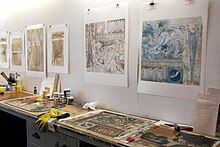Collagraphy

Collagraphy (sometimes spelled collography) is a printmaking process in which materials are glued or sealed to a rigid substrate (such as paperboard or wood) to create a plate.[1] Once inked, the plate becomes a tool for imprinting the design onto paper or another medium. The resulting print is termed a collagraph. The term "collagraph" was coined by Glen Alps in the 1950s, and is derived from the Greek word koll or kolla, meaning glue, and graph, meaning the activity of drawing.[2]

Artists use a variety of materials in collagraphy, including yarn, fabric, tape, different varieties of cut paper or card, leaves, and acrylic mediums.[3][2] The application of ink onto the collagraph plate is versatile, consisting of intaglio-inking into recesses, brayer or paintbrush inking onto relief surfaces, or a combination of these methods. A print can be made with or without use of a press.[4]
See also
References
- ^ Zeng, Natasha (2015-12-17). "Experiments in Truth: Collagraph Printmaking, Environmental Stewardship, School Psychology, Social Change, and Virtues & Vices". Wheaton Magazine. Retrieved 2023-12-05.
- ^ a b MacKenzie, Susie (2019). Making Collagraph Prints. Crowood Press. ISBN 9781785005824. OCLC 1112656269.
- ^ "Collagraph Printmaking [Lesson Plan]" (PDF). Dick Blick. 2008.
- ^ Oldfield, Vicky (2023). Mixed-Media Collagraph Prints: Creative Techniques. Crowood Press. ISBN 9780719841071. OCLC 1391439355.
Further reading
- Brenda Hartill; Richard Clarke (2005). Collagraphs and Mixed-Media Printmaking.
- Robert Adam; Carol Robertson (2008). Intaglio: Acrylic-Resist Etching, Collagraphy, Engraving, Drypoint, Mezzotint.
- Mary Ann Wenniger (1981). Collagraph Printmaking.
- Clare Romano; John Ross (1980). The Complete Collagraph: The Art and Technique of Printmaking from Collage Plates.
- Donald Stoltenberg (1975). Collagraph Printmaking.
